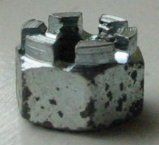NUTS



Your average every day full nut was most likely chamfered on one side only back in the 1940s/50s. At that time, there was also the option of double-chamfered nuts, and in later years, this became the norm. Extra thick nuts were another option, for special applications, of high strength joints. Also, brass exhaust manifold nuts.
Lock Nuts / Thin Nuts / Half Nuts
Also known as shear nuts and jam nuts in the USA, these are thinner than full nuts and are double-chamfered. They are used to lock full nuts, or where there is limited space, or weight saving is a priority.
 Square Full Nuts
Square Full NutsUsually single chamfered, these used to be common on bolts in the building trade including coach bolts. The AC 2 Litre uses them (BSW thread) not only on its coach bolts, but also on many countersunk screws that pass through the wood frame.

These are cheap thin nuts pressed out of thin sheet metal, either hexagonal or square.
Machine Screw Nuts

In the USA, machine screws were often used with machine screw nuts, which were very similar to lock nuts, but available in the small series of sizes, 0 to 12.

Not to be confused with castle nuts, these are thick nuts with slots cut into one face to accommodate a split-pin. As with full nuts, these could be either single or double chamfered (usually single chamfered in the 1940s).
Castle Nuts

Wing Nuts

These are nuts for hand tightening and quick release, which have a pair of wings. There are two basic types: Hot formed, which have rounded wings, and cold formed, which have squared off wings.
<< Page 2 ****** Page 4 >>
Page 1 - Screw Threads
Page 2 - Bolts, Screws and Studs
Page 4 - Nuts (Self-Locking)
Page 5 - Washers
Page 6 - Materials and Strength Grades
Page 7 - Tightening
Page 8 - Wood Screws and Nails
Page 9 - Fasteners for the AC 2 Litre Saloon
